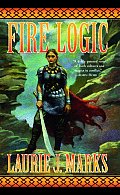
| Series: | Elemental Logic #1 |
| Publisher: | Tor |
| Copyright: | May 2002 |
| Printing: | March 2004 |
| ISBN: | 0-812-56653-X |
| Format: | Mass market |
| Pages: | 359 |
Zanja is sworn to the owl god, the god who crosses boundaries and moves between worlds. She appropriately starts Fire Logic as an emissary-in-training to the country of Shaftal from an independent tribe just beyond its borders. But just as she's learning her job, the man who embodies much of the magical power of Shaftal dies without a replacement, the government starts to crumble, and Shaftal slowly succumbs to the Sainnites, invaders from another country. The Sainnites take more and more of the land until finally Zanja's own village is involved and her life torn apart. A highly unlikely rescue only complicates matters, involving her in the Shaftal resistance and the secrets and struggles of a strange, drug-addicted half-blood giant.
Fire Logic didn't feel complex to me while reading it, but summarizing a bit of the plot for feel demonstrates how much there is in this book and how smoothly it's told. Marks takes a country through an invasion and fall, into civil war, and through the complicated ethics and stark economics of guerilla warfare, and that's only a fraction of the book. She adds a fascinating system of magic and personality, Karis's struggles against drugs, and Zanja's shifting personal loyalties for a story that, despite structural similarities to well-trodden fantasy ground, feels fresh and satisfyingly deep.
Typical of the better cut of fantasy, Marks's world is full of grey areas and a multiplicity perspectives. At the start, the good versus evil contrast appears stark, but it becomes more complicated as the story continues. The Sainnites aren't what they first appear, and prolonged war changes everyone. I liked the honest portrayals of the strain of guerilla war and the shifts in thinking that come with it. I also liked the attention to the details of supply and the economics of a prolonged fight. Marks's world feels lived in rather than created on the fly for the story.
The best part for me, though, was the magic system, which is less about magic than it is about personality. Marks's elementals embody the concept of their elements as much as any specific powers; indeed, the only traditional power coming with Zanja's fire elemental abilities appears to be unpredictable foresight. The element has a stronger effect on personality: fire logic is intuitive, daring, dangerous, and charismatic. This is hard to pull off. Zanja has to be not only a character in her own right but an exemplar of a style of thinking, one that shows in the other fire elementals she meets but manifests differently in each of them. Marks handles not only the distinct characters well but shows, purely through dialogue and story events, the intensification and powerful dynamic that forms between multiple fire elementals working together. She provides both recognizable types to give meaning to the elemental construct and leaves enough space for each character to be themselves.
The characterization throughout is excellent. It's a high compliment from me to enjoy a book that has, as a major theme, a struggle against drug addiction. Usually I find that topic too depressing and frustrating to want to read much of. But Karis is so wonderfully practical, sardonic, and persistent that she made the drug subplot work. The dynamic between her and Zanja is excellent, of course, but the dynamic between Karis and Norina is just as good, a great portrayal of a combative long-term friendship. At each point in the book, I felt I could understand the different perspectives of the characters even when I agreed with one of them more than the others. I never felt like the characters were pushed into simplistic or uncharacteristic decisions to advance the plot.
Fire Logic's main fault is that it's slow in spots, particularly during Zanja's protracted involvement in the civil war and her emotional struggles to deal with the events early in the book. There are a few dream sequeneces that annoyed me and a great deal of day-to-day life in a guerilla band that didn't hold my interest. It's not until part three that the elemental system comes into the foreground and the characters start using their abilities in significant ways rather than just learning about them.
This book didn't grab me with wonderful language or memorable scenes, but it has great depth of ideas. It's the best treatment I can remember of particular magical affinities strongly associated with personality types in a way that is immmediately recognizable but doesn't stifle or simplify characters. There are painful parts of the story to read through, but the ending is deeply satisfying and a great opening for further material. Recommended as quality, solid fantasy; it probably won't thrill you or attract you if you're not a fan of the medieval fantasy genre, but it's a great example of its kind.
Followed by Earth Logic.
Reviewed: 2008-01-10